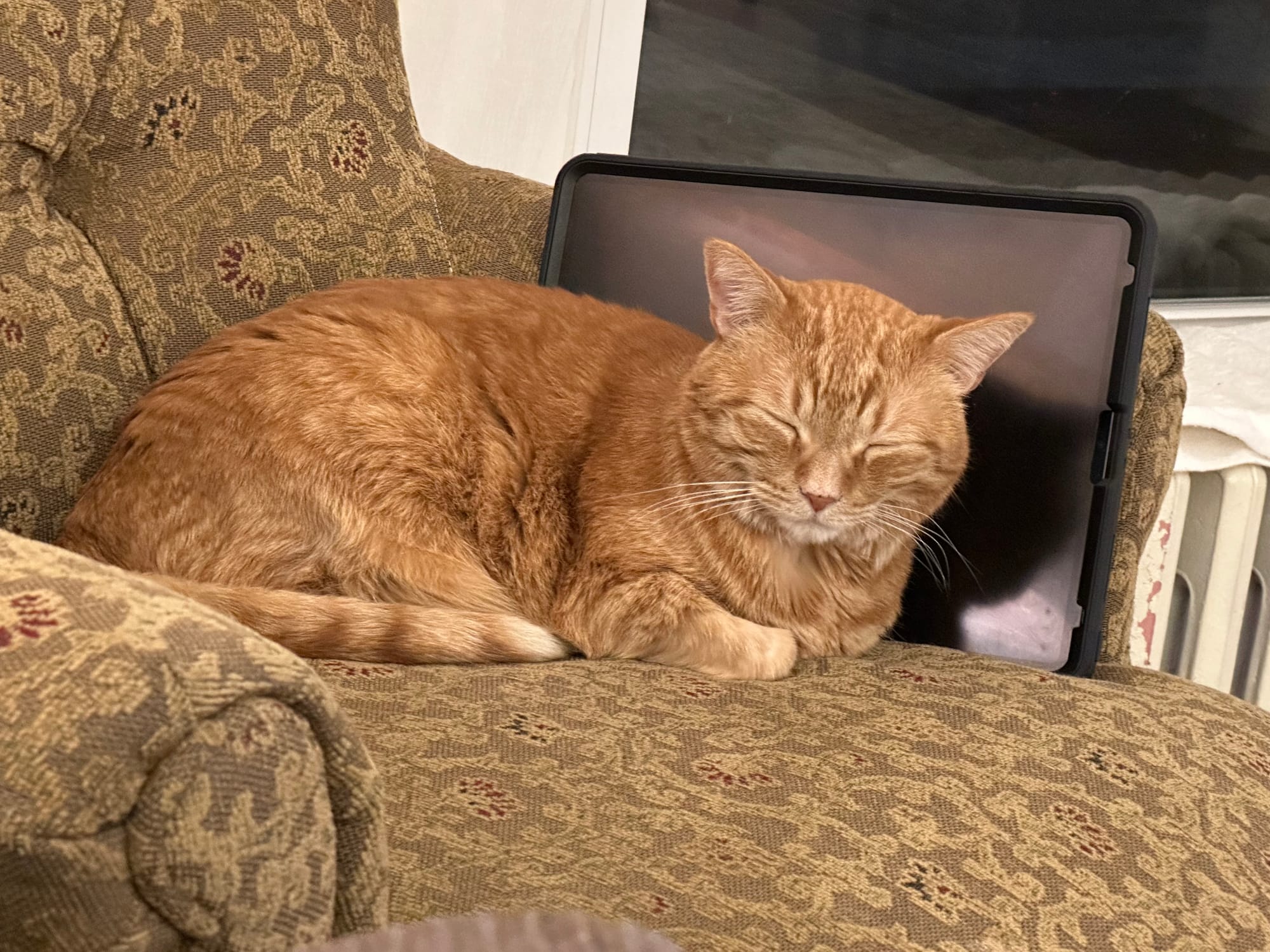Lent 5 - Extravagant Devotion: The Path to New Life

This Week in The Way of Grace
We’re in Week 5 of Lent, which brings us to page 59 in our book, The Way of Grace: Gospel Stories for Lent. Of course, whether you have a book or not, here’s an overview of all four readings for this Sunday, April 6, 2025, as my gift to you. As always, Buddy the Cat makes an appearance at the end.
Four Stories of God’s Lavish Grace
In these final days of Lent, as we journey toward Holy Week and Easter, our scripture readings invite us to consider what extravagant devotion truly means.
The passages weave together God's lavish grace with our response of wholehearted commitment.
- From Isaiah's vision of rivers in the desert
- to the psalmist’s promise of future joy,
- to Paul’s recalculation of what in his life is important,
- to Mary's alabaster jar of perfume,
we encounter a sacred pattern: transformation comes through extravagance. What appears wasteful to the practical mind proves to be the very path to new life.
As we think about these texts, consider where God is calling us to move beyond reasonable faith to extravagant devotion.
God's Extravagant Promise - Isaiah 43:16-21
Five hundred and fifty years before Jesus, the people of Israel grieved the loss of their homeland, clinging to memories of God's past deliverance. Into this desolation, Isaiah speaks God’s words of extravagant promise:
"See, I am doing a new thing!" (vs.19)
The prophet first reminds them of God's spectacular rescue at the Red Sea, with Egyptian chariots and horses overwhelmed by water. But then he pivots dramatically:
"Forget the former thing; do not dwell on the past." (vs. 18)
This isn't discounting the past but recognizing that God's future deliverance will be even more astonishing.
The imagery becomes deliberately extravagant:
-- rivers flowing through desert wastes,
-- wild animals honoring God,
-- water gushing forth where there was only parched ground.
This isn't just enough to get by; it's abundance beyond imagination. For people who counted each drop of water in the desert, the vision of abundant rivers was almost incomprehensible grace.
In our own spiritual deserts of dryness, emptiness, and disappointment, God's promise remains equally extravagant. The "new thing" God does isn't a slight improvement – it’s a complete transformation of impossible circumstances.
The God who makes rivers in the desert isn't interested in reasonable, measured responses to our predicaments. Divine generosity flows beyond our calculations, inviting us to look for signs of gratuitous grace breaking into our carefully curated lives.
Where might God be making a way where there seems to be no way in your life right now?

From Tears to Abundant Harvest - Psalm 126
Back home in Israel after the exile, Psalm 126 captures the emotional journey from weeping to joy, from scarcity to abundance.
The returned exiles remember their liberation as a dream-like experience, their mouths filled with laughter and tongues with songs of joy.
“The Lord has done great things for us, and we are filled with joy.” (vs. 3)
Yet their restoration remains incomplete, prompting their prayer:
"Restore our fortunes, LORD, like streams in the Negev." (vs. 4)
The psalm's most powerful image comes in its closing verses, depicting a farmer who plants precious seed while weeping. In ancient subsistence farming, using seed for planting meant having less to eat now, a genuine sacrifice.
“Those who sow in tears…”
Yet this tearful sowing eventually yields sheaves carried home with shouts of joy. The picture is one of multiplication beyond expectation. What was sown in sorrow returns multiplied in gladness.
“…will reap with songs of joy.” (vs. 5)
This agricultural metaphor illustrates our Lenten journey. What we surrender through fasting, prayer, giving, or emotional honesty isn't lost but transformed. Our tears, vulnerabilities, and sacrifices become the very seeds of new life.
The psalm doesn't promise that sorrow immediately disappears, but assures us that what we plant in tears will return as joy.
The harvest isn't merely adequate but abundant. Our arms will be filled beyond what we could carry.
This extravagance reflects not just natural change, but God's generous economy where what we surrender returns abundantly multiplied.

The Radical Revaluation - Philippians 3:4b-14
But, sometimes we rely on our own resources, rather than God’s. If anyone had reason for religious self-confidence, it was the apostle Paul.
His impressive heritage, experience, and education looked great on his resume:
- circumcised on the eighth day,
- of the people of Israel (God’s chosen),
- of the tribe of Benjamin,
- a Hebrew of Hebrews,
- a Pharisee, blameless under the law.
Yet Paul's encounter with Christ led to an extravagant revaluation:
"…I consider everything a loss because of the surpassing worth of knowing Christ Jesus my Lord...." (vs. 8)
Continuing to make his point, Paul uses shockingly strong language, counting his former religious accomplishments as "garbage".
This isn't false humility but a radical reordering of values. Paul doesn't merely adjust his priorities -- he completely overturns them, demonstrating extravagant devotion through what he's willing to surrender.
The passage culminates with Paul strapping on his spiritual running shoes –
“I press on toward the goal to win the prize for which God has called me heavenward in Christ Jesus.” (vs. 14)
This isn't a casual jog but an all-out sprint, every muscle straining with his eyes on the prize.
Paul models for us a devotion that holds nothing back, that doesn't calculate spiritual return on investment but is all-in for "the surpassing worth of knowing Christ."
In our reserved, buttoned-up approach to spiritual life, Paul's extravagance challenges us. What would it mean to consider everything else trash compared to knowing Christ?
Not merely adding faith alongside other priorities, but allowing Christ to radically redefine what we value?
As we approach Holy Week, Paul invites us to look closely at what we’re holding on to, challenging us to go all-in on knowing Christ.

The Fragrance of Devotion - John 12:1-8
Paul’s testimony brings us the story of Mary, who does go all-in as her extravagant devotion demonstrates.
Six days before Passover, with the cross looming on the horizon, Jesus attends a dinner where each person expresses devotion differently.
-- Martha serves the meal,
-- Lazarus (recently raised from the dead) reclines at the table with Jesus, and
– Mary performs an act of extravagant devotion that fills the house with fragrance.
“Then Mary took about a pint of pure nard, an expensive perfume; she poured it on Jesus’ feet and wiped his feet with her hair. And the house was filled with the fragrance of the perfume.” (vs. 3)
Mary's offering is stunning in its excess: pure nard, imported from the Himalayas, worth a year's wages.
The perfume likely represented her life savings or inheritance. Breaking open the alabaster jar meant there was no going back—no saving some for later, no half-measures. This wasn't a symbolic portion but everything she had.
Judas voices the reasonable objection:
"Why wasn't this perfume sold and the money given to the poor?" (vs.5)
His insincere calculation appears logical, but Jesus defends Mary's extravagance:
"Leave her alone. It was intended that she should save this perfume for the day of my burial.” (vs. 7)
In this sacred moment, Jesus affirms that some expressions of love transcend practicalities. Whether she fully understood the meaning of her devotion, Mary's act symbolically prepares Jesus for his burial.
The perfume's fragrance permeates the entire house -- just as Mary's devotion continues to fill our imagination. Her extravagance reminds us that measured, reasonable faith may miss the profound moments that call for everything we have.
As we approach Christ's self-sacrifice, where are our extravagant expressions of devotion? What alabaster jars in our own lives -- something precious, practical, reasonable to keep -- might we break open as an act of love?
Beyond Cost-cutting to New Life
All of these passages remind us the path to new life is surprisingly extravagance:
God doesn't merely meet minimum requirements for His people, but provides rivers in deserts;
Our seeds sown in tears yield joyful abundant harvests;
Paul's running toward Christ means leaving behind everything else; and
Mary's expensive offering fills an entire house with fragrance.
As we enter the final days of Lent, these stories challenge us to move beyond bargain-basement faith to extravagant devotion. The way to Easter crosses territory that will appear wasteful to the bookkeeper in all of us.
Yet this very irrational extravagance -- God's toward us and ours in response -- becomes the path to transformation. The fragrance of devotion, like Mary's perfume, lingers long after the cost is forgotten.
Prayer: Generous God, who makes rivers flow in desert places, give us courage to move beyond our careful calculations into extravagant devotion. Help us to break open our alabaster jars, counting everything as loss compared to the surpassing joy of knowing Christ. Amen.
Buddy the Cat and the problem of screen time




